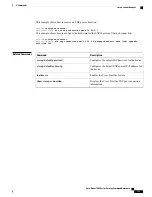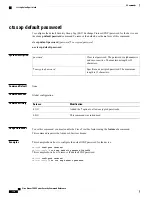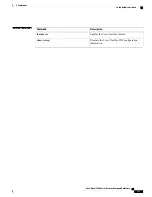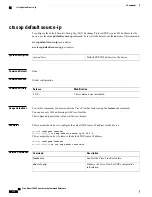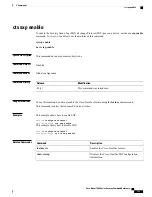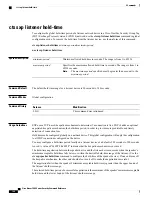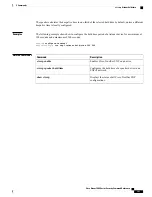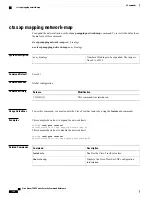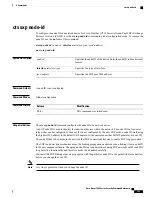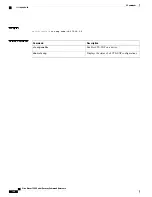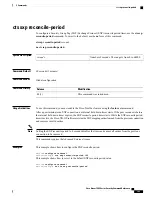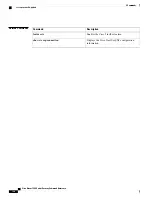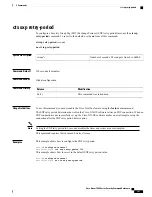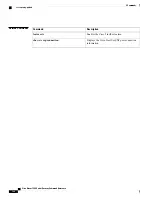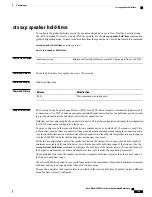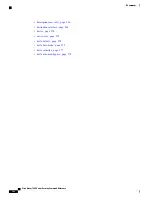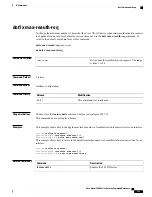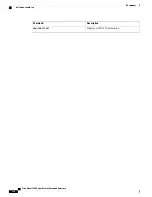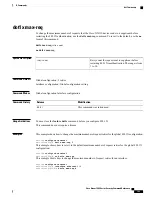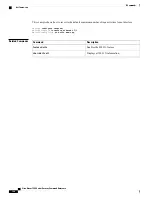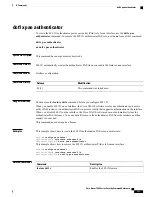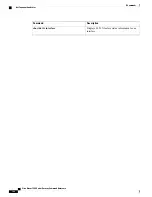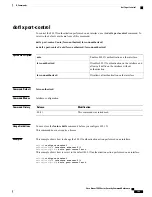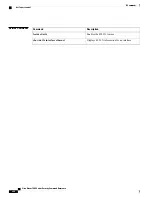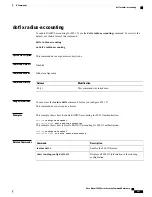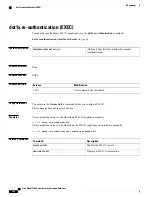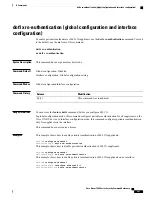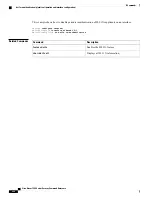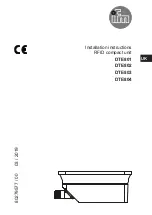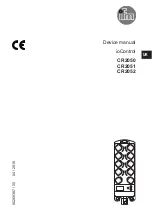
cts sxp speaker hold-time
To configure the global hold-time period of a speaker network device in a Cisco TrustSec Security Group
Tag (SGT) Exchange Protocol version 4 (SXPv4) network, use the
cts sxp speaker hold-time
command in
global configuration mode. To remove the hold time from the speaker device, use the
no
form of this command.
cts sxp speaker hold-time minimum-period
no cts sxp speaker hold-time
Syntax Description
Minimum allowed hold time in seconds. The range is from 1 to 65534.
minimum-period
Command Default
The default hold time for a speaker device is 120 seconds.
Command Modes
Global configuration
Command History
Modification
Release
This command was introduced.
8.0(1)
Usage Guidelines
The Security Group Tag Exchange Protocol (SXP) uses a TCP-based, keepalive mechanism to determine if
a connection is live. SXPv4 adds an optional negotiated keepalive mechanism, the hold-time period, in order
to provide more predictable and timely detection of connection loss.
Hold time can be configured globally on a network device. This global configuration will apply the configuration
to all SXP connections configured on the device.
You may configure a hold-time period locally on a speaker device or a default of 120 seconds is used. This
is the shortest period of time a speaker is willing to send keepalive messages for keeping the connection active.
Any shorter hold-time period would require a faster keepalive rate than the rate the speaker is ready to support.
A value of 0xFFFF indicates that the keepalive mechanism is not used.
The hold-time negotiation between the speaker device and the listener device succeeds when the speaker
’
s
minimum acceptable hold time falls below or within the desirable hold-time range of the listener. (Use the
cts sxp listener hold-time
command to configure the hold time of the listener device.) If one end turns off
the keepalive mechanism, the other end should also turn it off to make the negotiation successful.
The negotiation fails when the speaker
’
s minimum acceptable hold-time is greater than the upper bound of
the listener
’
s hold-time range.
The selected hold-time period of a successful negotiation is the maximum of the speaker's minimum acceptable
hold time and the lower bound of the listener's hold-time range.
The speaker calculates the keepalive time to one-third of the selected hold time by default, unless a different
keepalive time is locally configured.
Cisco Nexus 7000 Series Security Command Reference
189
C Commands
cts sxp speaker hold-time
Summary of Contents for Nexus 7000 Series
Page 2: ... Cisco Systems Inc All rights reserved ...
Page 20: ...Cisco Nexus 7000 Series Security Command Reference xx Contents ...
Page 62: ...Cisco Nexus 7000 Series Security Command Reference 36 A Commands aaa authentication rejected ...
Page 78: ...Cisco Nexus 7000 Series Security Command Reference 52 A Commands aaa user default role ...
Page 157: ...Cisco Nexus 7000 Series Security Command Reference 131 C Commands crypto ca import ...
Page 172: ...Cisco Nexus 7000 Series Security Command Reference 146 C Commands cts role based sgt map ...
Page 186: ...Cisco Nexus 7000 Series Security Command Reference 160 C Commands cts role based access list ...
Page 256: ...dscp dscp Cisco Nexus 7000 Series Security Command Reference 230 D Commands deny IPv4 ...
Page 271: ...protocol Cisco Nexus 7000 Series Security Command Reference 245 D Commands deny IPv6 ...
Page 274: ...dscp dscp Cisco Nexus 7000 Series Security Command Reference 248 D Commands deny IPv6 ...
Page 291: ...Cisco Nexus 7000 Series Security Command Reference 265 D Commands description identity policy ...
Page 293: ...Cisco Nexus 7000 Series Security Command Reference 267 D Commands description user role ...
Page 299: ...Cisco Nexus 7000 Series Security Command Reference 273 D Commands device role ...
Page 313: ...Cisco Nexus 7000 Series Security Command Reference 287 E Commands enable Cert DN match ...
Page 340: ...Cisco Nexus 7000 Series Security Command Reference 314 E Commands eq ...
Page 344: ...Cisco Nexus 7000 Series Security Command Reference 318 F Commands feature cts ...
Page 350: ...Cisco Nexus 7000 Series Security Command Reference 324 F Commands feature ldap ...
Page 369: ...G Commands gt page 344 Cisco Nexus 7000 Series Security Command Reference 343 ...
Page 372: ...Cisco Nexus 7000 Series Security Command Reference 346 G Commands gt ...
Page 398: ...Cisco Nexus 7000 Series Security Command Reference 372 I Commands interface policy deny ...
Page 497: ...Cisco Nexus 7000 Series Security Command Reference 471 K Commands key config key ...
Page 504: ...Cisco Nexus 7000 Series Security Command Reference 478 K Commands key string ...
Page 518: ...Cisco Nexus 7000 Series Security Command Reference 492 L Commands It ...
Page 536: ...Cisco Nexus 7000 Series Security Command Reference 510 M Commands monitor session ...
Page 552: ...Cisco Nexus 7000 Series Security Command Reference 526 O Commands other config flag ...
Page 569: ...dscp dscp Cisco Nexus 7000 Series Security Command Reference 543 P Commands permit IPv4 ...
Page 584: ...protocol Cisco Nexus 7000 Series Security Command Reference 558 P Commands permit IPv6 ...
Page 587: ...dscp dscp Cisco Nexus 7000 Series Security Command Reference 561 P Commands permit IPv6 ...
Page 622: ...Cisco Nexus 7000 Series Security Command Reference 596 P Commands propagate sgt ...
Page 664: ...Cisco Nexus 7000 Series Security Command Reference 638 R Commands rule ...
Page 737: ...Cisco Nexus 7000 Series Security Command Reference 711 Show Commands show arp access lists ...
Page 841: ...Cisco Nexus 7000 Series Security Command Reference 815 Show Commands show ipv6 dhcp ldra ...
Page 992: ...Cisco Nexus 7000 Series Security Command Reference 966 T Commands trustedCert ...
Page 1015: ...Cisco Nexus 7000 Series Security Command Reference 989 V Commands vlan policy deny ...
Page 1017: ...Cisco Nexus 7000 Series Security Command Reference 991 V Commands vrf policy deny ...
Page 1018: ...Cisco Nexus 7000 Series Security Command Reference 992 V Commands vrf policy deny ...

